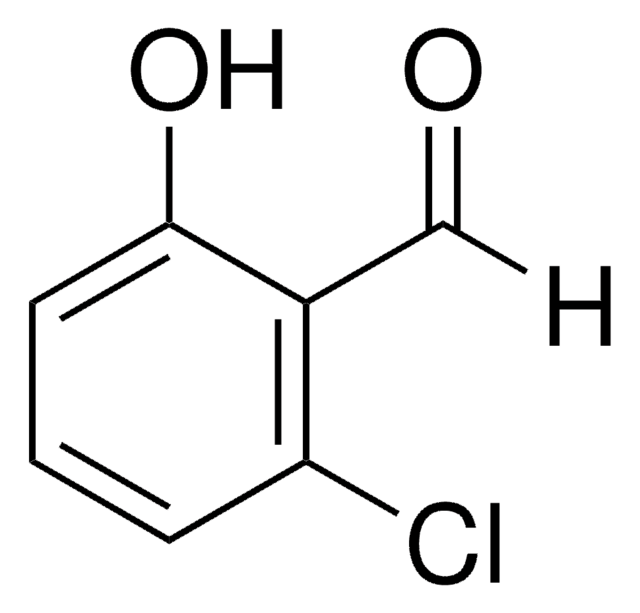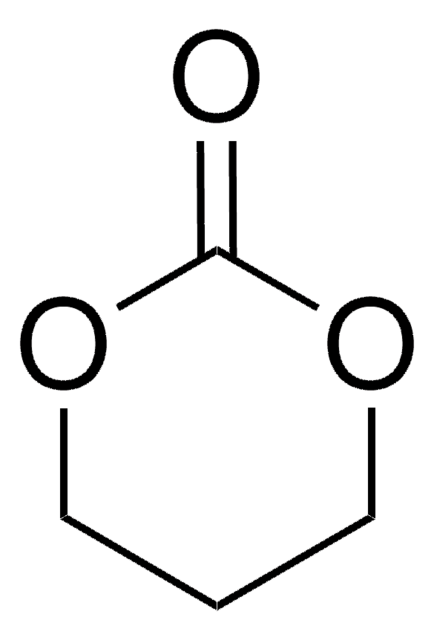All Photos(1)
About This Item
Empirical Formula (Hill Notation):
C4H4O4
CAS Number:
Molecular Weight:
116.07
EC Number:
MDL number:
UNSPSC Code:
12162002
PubChem Substance ID:
NACRES:
NA.23
Recommended Products
Quality Level
Assay
≥99%
mp
82-86 °C (lit.)
shipped in
dry ice
storage temp.
−20°C
SMILES string
O=C1COC(=O)CO1
InChI
1S/C4H4O4/c5-3-1-7-4(6)2-8-3/h1-2H2
InChI key
RKDVKSZUMVYZHH-UHFFFAOYSA-N
Looking for similar products? Visit Product Comparison Guide
Related Categories
General description
Glycolide is a cyclic dimer of α-hydroxy acid that can be used in the formation of aliphatic polyester. It is synthesized by the dimerization of glycolic acid. It forms a low toxic synthetic biodegradable polymer that can be used in medical applications. It is majorly used in the formation of a highly crystalline poly(glycolide) by ring opening polymerization.
Application
Glycolide can be used as a monomer in the preparation of poly(lactic-co-glycolide)(PGLA) via copolymerization with lactide monomer. PGLA is further used in the following applications:
- Porous PGLA microsphere scaffolds are used in bone repair applications.
- Encapsulated PGLA nanoparticles can be used in drug delivery and tissue engineering applications. Polymeric micro/nanoparticles made from PLGA have gained significant interest for their appealing characteristics, including biodegradability, biocompatibility, prolonged drug release, and safeguarding the drug against degradation.
Signal Word
Warning
Hazard Statements
Precautionary Statements
Hazard Classifications
Acute Tox. 4 Oral - Eye Irrit. 2
Storage Class Code
11 - Combustible Solids
WGK
WGK 3
Flash Point(F)
Not applicable
Flash Point(C)
Not applicable
Personal Protective Equipment
dust mask type N95 (US), Eyeshields, Gloves
Choose from one of the most recent versions:
Certificates of Analysis (COA)
Lot/Batch Number
Don't see the Right Version?
If you require a particular version, you can look up a specific certificate by the Lot or Batch number.
Already Own This Product?
Find documentation for the products that you have recently purchased in the Document Library.
Customers Also Viewed
Types of biodegradable polymers
Introduction of Bioplastic Engineering, 81-151 (2016)
Towards electroactive gel artificial muscle structures
Electroactive Polymer Actuators and Devices (EAPAD) XX, 10594, 1059408-1059408 (2018)
Anne Marit de Groot et al.
Journal of controlled release : official journal of the Controlled Release Society, 266, 27-35 (2017-09-18)
The skin is an attractive organ for immunization due to the presence of a large number of epidermal and dermal antigen-presenting cells. Hollow microneedles allow for precise and non-invasive intradermal delivery of vaccines. In this study, ovalbumin (OVA)-loaded poly(lactic-co-glycolic acid)
Lavanya Venkataraman et al.
Journal of tissue engineering and regenerative medicine, 10(12), 1041-1056 (2014-04-17)
The degradation of elastic matrix in the infrarenal aortic wall is a critical parameter underlying the formation and progression of abdominal aortic aneurysms. It is mediated by the chronic overexpression of matrix metalloprotease (MMP)-2 and MMP-9, leading to a progressive
Feiyang Li et al.
ACS omega, 5(31), 19796-19804 (2020-08-18)
Bone regeneration has attracted extensive attention in the field of regenerative medicine. The influence of biomaterial on the extracellular environment is important for regulating the biological functions of cells for tissue regeneration. Among the various influencing factors, we had previously
Our team of scientists has experience in all areas of research including Life Science, Material Science, Chemical Synthesis, Chromatography, Analytical and many others.
Contact Technical Service













